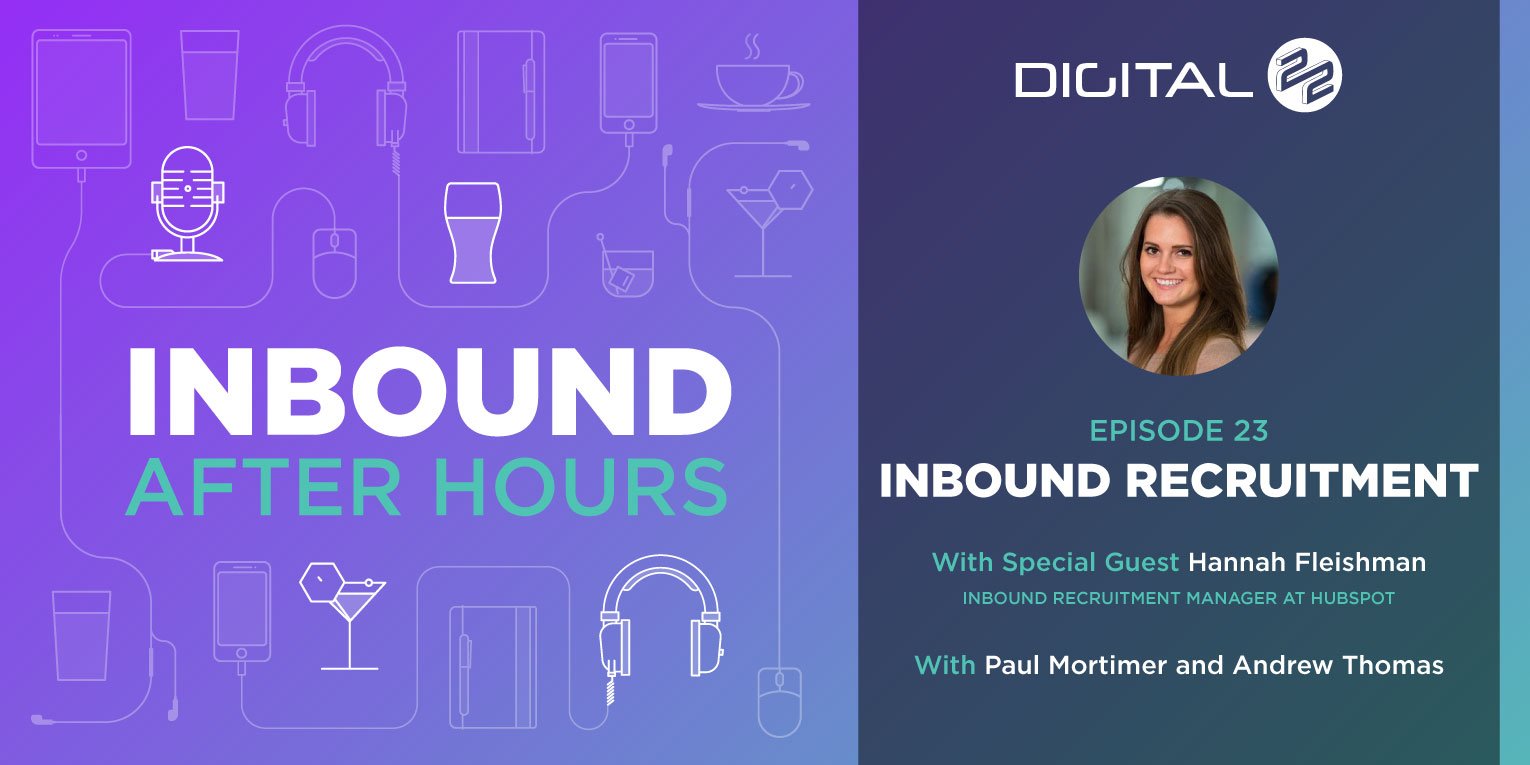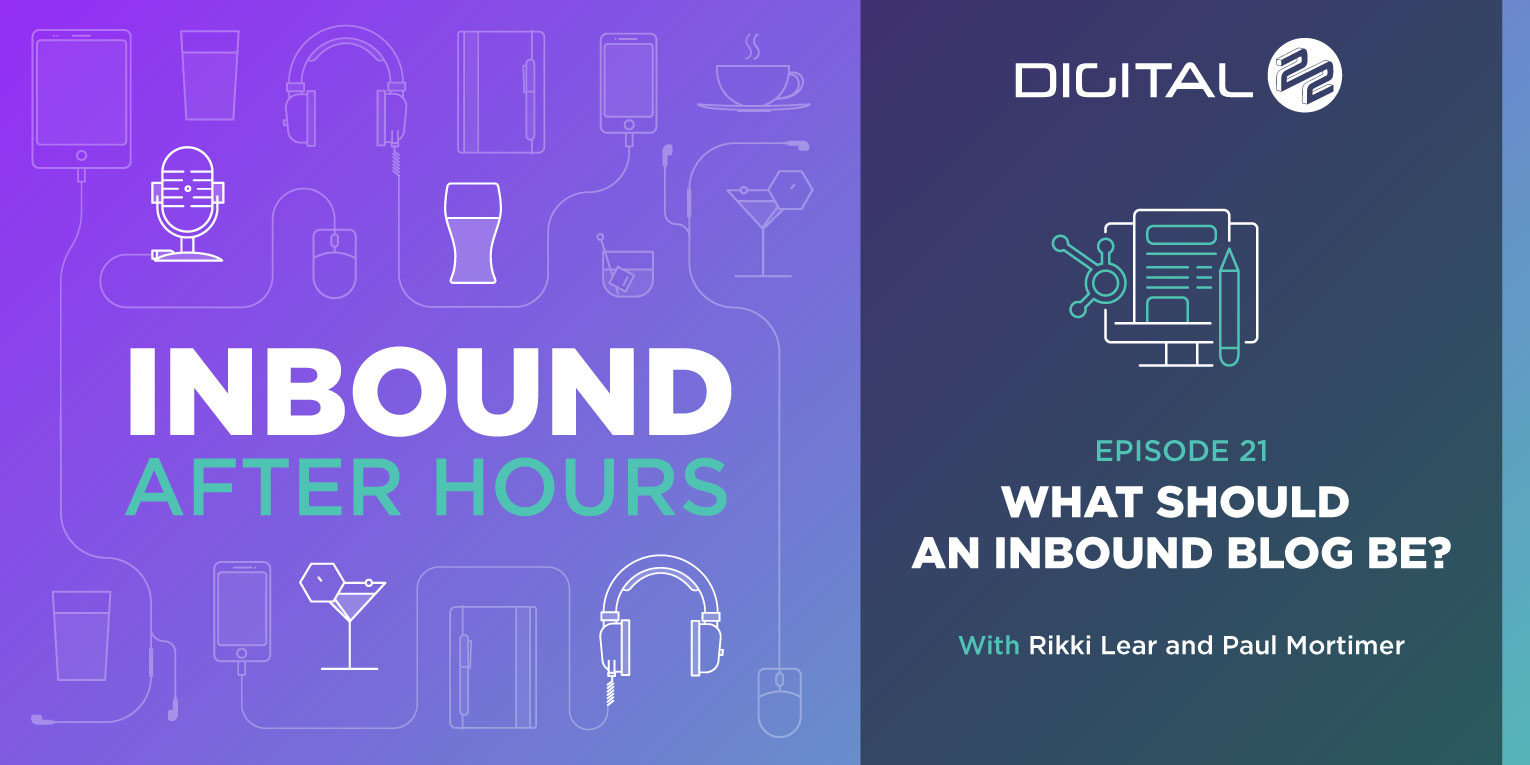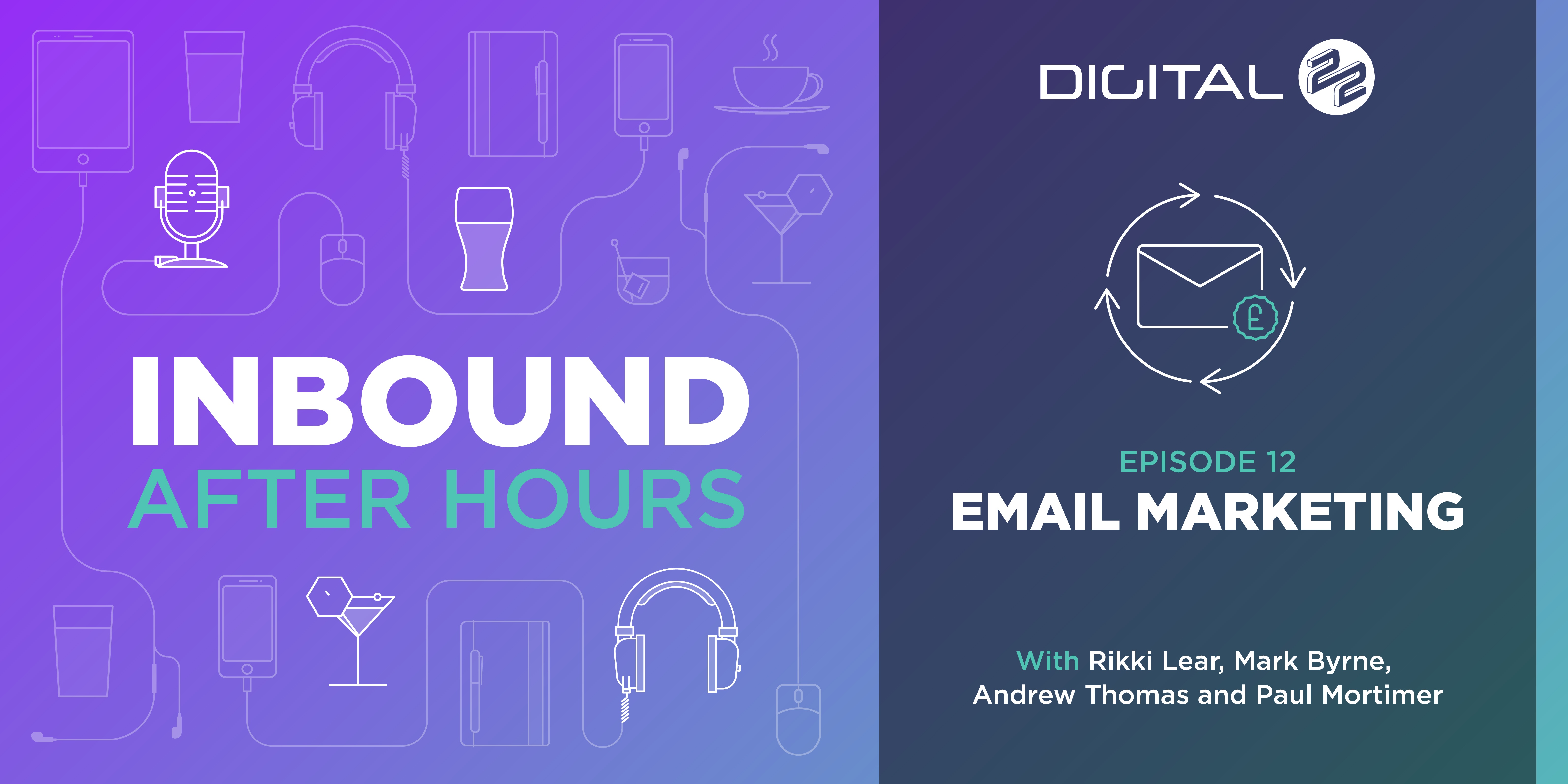In this episode of Inbound After Hours, we speak to Hannah Fleishman who is head of Inbound...
It's time for another episode of our Inbound After Hours podcast. In this episode, we are joined by Olivia Kirwan, who is a Channel Account Manager at HubSpot. Olivia has a wealth of knowledge about account based marketing and she is here to share that with us.
Account based marketing is a strategic approach on how to target specific companies. You think about who you want to target and then reach out to them. So, is account based marketing arguably outbound marketing? Not if you identify who you want to work with correctly.
Find out the six key steps of account based marketing in this podcast and how you can make this work for you.
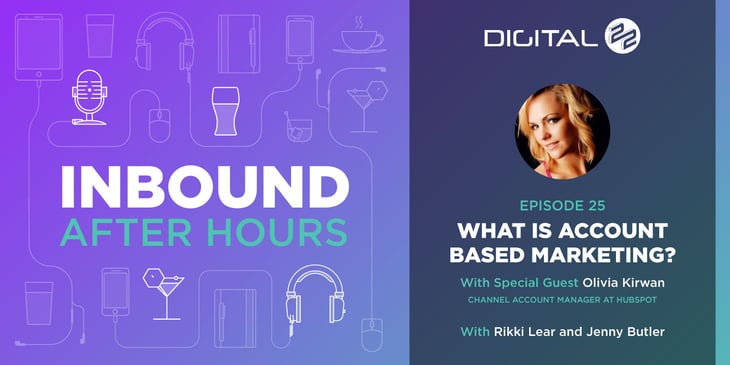
Watch...
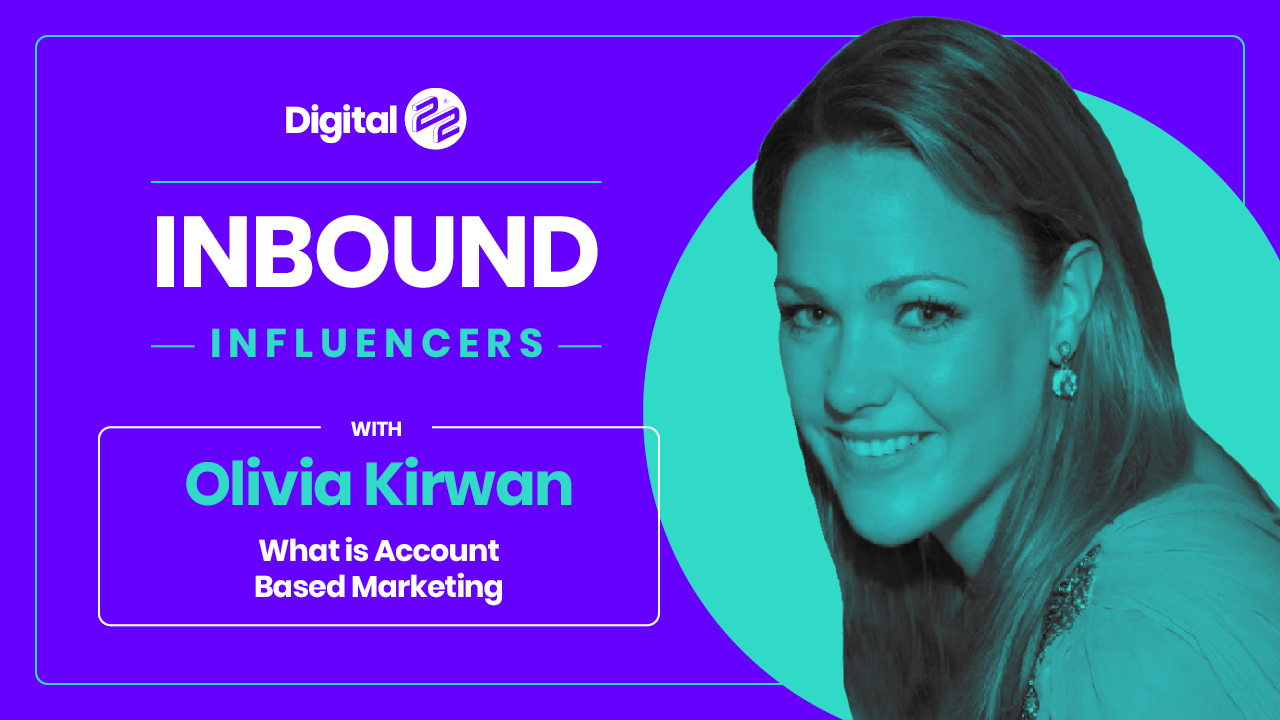
Listen...
Thanks so much for joining us this week.
Have some feedback you’d like to share? Do it in the comments below!
Full transcript to follow:
- Hey guys, welcome to Inbound After Hours, today we've got a special guest, we've got Olivia coming from HubSpot to talk to us about account-based marketing and there's myself and Jenny, who recently joined us from HubSpot actually, joining following our first episode on this side of the fence.
- Yeah, on this side of the fence.
- You were on one of our first episodes, but you were still at HubSpot at the time and you've talked to us about podcasting.
- Yeah, I was, so it was very cool, so now I'm the resident leprechaun at Digital 22,
-There we go.
- so there we go.
- Fantastic, so Olivia, do you wanna start with the obvious place, what is account-based marketing?
- Yeah, absolutely, so account-based marketing is a strategic approach on how you target specific companies, so effectively what you're doing is you're thinking about the types of companies that you want to work with or the types of accounts and then you're reaching out to them, so you're figuring out, right, well, what type of content should I send them and you have a strategic approach on how you can act with them.
- And in your last role at HubSpot, this is something you were actively involved with, so how did HubSpot approach that, considering they're very much advocates of inbound as well?
- Exactly, and there's always that side, we're like inbound and outbound,
- Yeah.
- and we'll get to that, I think for the next one.
-Yeah.
- On the HubSpot side of things, so for four years, I was selling direct and how I would target my section was on the corporate side, so I was targeting corporate accounts and what that means is I would look at companies, that were size 200 to 500 within the UK and also as well specifically London.
- Okay.
- The reason that I chose London was because I would travel to London every month and I wanted to reach out to very specific types. Within that, it's obviously company-based, so I was thinking, right, 200 to 500, I also wanted to work with computer software, so that they were educated in the area, London and they would have certain types of turnover as well, turnover wasn't as important for me as the type of company, the size, if they've both sales and marketing teams.
- Yeah, yeah, makes sense, so did you have a strict sort of methodology you followed, that you were trained on at HubSpot or did you have to find your own way with it?
- A little bit of both, there's a guideline and then you kind of figure out what works for you, so the kind of, the methodology around it, there's typically six steps to account-based marketing, the first step is identifying the companies or the accounts that you want to work with, the next step is then, right, who would, in that account, who would in that company and for account-based marketing, you typically need three different types of personas, so it'll be the marketing, for me, it'll be the sales director and for the business owner, not so much the CEO, because if a CEO had a company of 500 people, he may not necessarily want to be involved, but I would need at least three people on account-based marketing.
- Okay.
- So now I've targeted my account, then I've targeted who I want to work with and then what I do is create content around that, decide which channels I want to use, in terms of the social, email, direct mail and then run that campaign and look at the data behind it.
- Okay, so from a marketer's perspective, it sounds just like sales, like what's the difference between account-based marketing and just direct selling? Is it the methodology and the thought and the strategy behind it, that makes a difference?
- Exactly
- Okay.
- and I think as well, people get like, "Oh, account-based marketing, "ooh, this is something that's new and different."
- Yeah.
- They've just put a buzzword on it and said, "This sounds way better than "I'm gonna contact all these directly,"
- Yeah.
- you've just got that little bit of a strategy behind it, than saying, right, well, these are the types of companies I want to work with, we're a great fit company, we only wanna work with these types.
- Okay.
- On that, what's your ideal fit? Company or account that you'd like to work one-to-one with?
- Yeah, so obviously as most companies do it above all else, so at this moment in time, I think our sweet spot's between five and 15 million, from a revenue perspective, below five can sometimes be difficult to hire and afford an agency, above, maybe 15's a little bit low, but when you start getting higher and higher on revenue size, it becomes a little bit more bureaucratic, there's a lot of people involved in the sales process and then there's actually a lot of people involved in the marketing sign off of materials, which can slow things down, so that sort of revenue fits quite nicely for us. They've gotta be obviously primarily English-speaking, although we do run other language campaigns.
- Does that include...
- Yeah.
- We're fluent in English and American now. It's been such a change.
- Awesome.
- Yeah.
- National product or international product, what we do doesn't look great on a regional level. Those are the big ones--
- How so?
- Little bit, when you're very content-driven, unless there's a massive keyword volume, if you... if you're writing a blog about a subject, it's normally very hard to tag on that a regional aspect to it, so what is in that marketing in North East England, like no one's, most terms, when you working particularly at the awareness space, no one's looking regionally,
- Yeah.
- there are exceptions to that, where there's big volumes in regions, but on a whole, particularly B-to-B side, people are just searching for answers to their problems or solutions, as an overarching topic and what we found when we've done these in the past on a regional level, you almost end up with wastage, because if someone only wants to serve a certain part of the country, there's people downloading the stuff from all the part of the country,
- Yeah.
- you are, you've just got these people, where they just go, "We don't want them, we'll have this 25%," which can work, but it doesn't quite feel right from a marketer's perspective and then we're looking for like the obvious sort of inbound fit, so the stuff that HubSpot will teach us, that you need to have a considered lifecycle, a decent, average Arda value or lifetime value and good fit for inbound, they have to take HubSpot is obviously one of our criterias as well,
- Ours too.
- Yeah, yours too, so we we've all got that in common. So I think we have probably slightly similar criteria to HubSpot, given what we do, yeah.
- And sales and marketing, is that important now for you or do you just want marketing or feel the need to have sales and marketing teams?
- Yeah, so we had a change, it's probably 18 months, two years ago from the working with business owners primarily as a point of contact through to marketing contacts, or marketing managers or directors, who have the time to spend with us and review stuff and sign things off, there's actually a lot of work on the client's side still and when we get a lot of business owners, obviously there's always exceptions, but they're normally time poor and it's very hard to keep that going, so predominantly we do ask that they have a marketing person at their end and then more and more, a salesperson at their end, because the other situation you get into is you'd start sending people a lot of leads,
- Yeah.
- and there's no one sat there to follow them up
- And there's no one to follow over.
- or close them, you know as well as anybody, that inbound in theory, you can set automation in place and they'll contact you when they wanna buy something, but it's normally not as idyllic as that, you know, and we have to contact them at few stages before and if they've got no salespeople their end, or no one can afford to pick up the phone, you can still make that close rate drop, so we've had to start trying to add that recently into our complication.
- Or even the timeline will extend as well,
- Yeah, yeah, definitely, just got frustrating for both sides of the relationship definitely.
- Yeah.
- I mean, what's been your exposure to account-based marketing at the moment, have you heard a lot of people asking about it? And like you said, it's a bit of a buzzword for me at the moment, a lot of people seem to be saying it, but I don't know too many people, who are doing it or they're doing it and they don't know they're doing it,
- Yeah.
- as you alluded to, is that--
- Yeah, it would have been something definitely within HubSpot, but it's very much like again with the buzzword, it's talked about a lot in HubSpot definitely. I think it's an almost smarter way, if you're gonna have to reach out direct and you don't really wanna like, I suppose the principle of HubSpot being on inbound is that you're a little bit more enlightened then, when you go in to look at say the sales or the sales process, you approach that with a little bit more of, if you wanna call it, an inboundy mind,
- Yeah.
- so you change how you do that and I think account-based marketing just brings you in to be able to be like, okay, well, we can take a more, I'll use the word, holistic, it's a very hippy word that we can use, but it is a more holistic way to look at sales, sales can be very much like, although I understand the bottom line and getting that across the line is important, but you can bring an element of an inboundy sort of ethos into that, which I think account-based marketing basically is,
- Yeah.
- and that's what I think like people like Olivia, people who are working at that, they go at that with a different mindset,
- Yeah.
- and I think it's very successful, because you just come across as being a lot more genuine, it's a lot more personalised, it becomes a bit more than just the bottom line, it's really about you know, like, is it a good fit, for example, like that's something that Olivia would have looked at very carefully and then like, is it right or is this something that you know, isn't gonna be great for them, it's thinking about the other side of it as well, like making sure that it's best for everybody all round to proceed.
- I think you hit the nail on the head there, the personalization aspect
- Yep.
- is so key, like that's the number one thing to take away and you need the content, so you need both marketing and you need the salesperson to deliver it, but there's no point, if it's not personalised, there's no one gonna open your email, it's not that you've sent it out to absolutely everybody, like I've, even a funny story, like I used to sell private jets to like you know, 1% of the richest people in the world,
- I was gonna say, that's not a big target--
- and like this is--
- I love my jet.
- And like I used to send the same generic email to everybody, like thinking this would work, like, how naive was I?
- Yeah.
- Whereas if I had have had this approach, if I had understood the personalization, if somebody within that company, if they'd opened up a new office, then I would have realised that, you know, they could be flying from here to here, but sending it out, you know, the same email, expecting a response, how anybody even responded to me is beyond me, but really if I had, looking back now, if I had have had these six key steps, I would have been a lot more successful within that role and sold a lot more private jets
- Yeah.
- or flights on private jets as well, so, but the personalization item for me is number one. You also then need to have your tailored content, that's where marketing comes in to place, so it's both sales and marketing, so you're aligning the two up effectively.
- And you show them all your research as well, I think from my kind of experience of sales and working in even light sales, nothing kind of based and I think it's worth lots and lots of money previously or anything, but like I think sales people do an awful lot of research in the background, even if you're gonna cold call, you'll do your research, but you don't often let these companies know, hey, I've had a read online about you and I kind of know a bit about you and if you're not personalising it, they don't know that, so why not show all the research you've done and be confident when you're approaching them, be like, I did all this research, I know all of this stuff and yeah, but without being creepy, I guess.
- Oversalesy,
- Yeah.
- never be oversalesy, 'cause people just don't like salespeople.
- I saw you walking your dog yesterday, you need a dog lead, like that's not creepy at all.
- And when you start receiving direct phone calls, as a lot of us do from a sales perspective, you always just assume the worst, that they've just got an auto dial going
- Yeah.
- and they just call in and they don't even know who they're coming through to
- The Yellow Pages, they've got the Yellow Pages deck and they're ready to, I've done that, I have been given a Yellow Pages before and told to call people.
- Yeah,
- I know, that's a marketer's worst nightmare, that would freak me out.
- That's, yeah and a salesperson's
- Okay.
- worst nightmare too.
- I think about the research, that's like, if someone can prove to me in that opening 15 seconds that now I'm calling Digital 22, because I know this about you or I think you'll need this, I'm not just calling everyone to try and sell what I've got, it does warm you up a little bit, definitely.
- Yeah and it does take time, account-based marketing, it's gonna take longer, because effectively you are outreaching to them,
- Yep.
- they're not coming to you,
- Yeah.
- so on that, you have to make sure, like I would always use HubSpot sequences, that I would send at least like six to eight emails,
- Yeah.
- though not in one day, but over the course of say, within six weeks and then I could go in and change or edit it, if I saw something coming up, but they were all personalised and tailored to them, so whether it was an event in London that we had, you know, that might email three, but it's really about making sure that one, it's relevant for them, you're not too salesy, it's personalised, the content's right, you've done your homework, so yeah, I found the HubSpot sequences just perfect for it.
- I think if you tick all those boxes, I guess like any marketing tool really, they can be used for good and evil, with sequence, it's probably not sequences, but similar tools that do this, there's nothing more annoying than someone who's really not targeted to you sending you them, 'cause it's one of my pet peeves at the moment, they seem to have got really popular with, and you always get that one like eight in, where they're trying to be funny like, "You fell down a hole,"
- Shall I call for help?
- Yeah, yeah.
- Are you okay?
- And the first time you get it, you laugh, but it's, yeah, when you can tell they haven't done their research or it's not personalised and all that stuff, it's really bad, but I guess like any sales, if you just rang people about that, it's really bad, so it's just,
- Yeah.
- it's a way of using the good tools that are out there, but in a smart way, isn't it?
- Yeah.
- And I think the point that you made earlier about the mindset being doing this in inboundy ways, quite good, 'cause obviously that ties back to things like personas and all that, but I remember when HubSpot started moving into the sort of ad space and prior to that, HubSpot were a bit, "Don't do ads, they're evil," sort of thing,
- Yeah.
- and we were doing ads at the time with, from a PVC and social ads viewpoint, then when they started rolling this out, they did it the same ways, like, "Okay, these can be good, "but do it in an inboundy way," if you're targeting people, that aren't cold, they've come to your sites, like remarketing or they download an ebook and you wanna show them the next consideration piece or whatever, there's always with any aspects of that, if you've got the inboundy mindset, you can make it work and you can make it not feel
- Yeah.
- cheesy or terrible, or whatever the old school methods were.
- You keep the prospect then, I always like to, the nice way to kind of think about it is if you're doing that in an inboundy way, you're keeping the prospect and you're keeping the customer at the core and the heart and the centre of what you're trying to do and yes, you want the sale and you want the business and that's fine, but I think it's again, just a bit more of a human way of doing things, 'cause generally outbound is considered very like cold calling, it's in the name, right?
- Yeah.
- Yeah, I think it's definitely, it's a mindset you just have to get into, yeah.
- And thinking about the company, so it's always the company first,
- Yeah.
- so who are those types of accounts that we wanna work with and then within that, you have to do your research, know the types of people
- Yeah.
- and then whether it's industry, whether it's location, you start to understand right, what best fits us,
- Yeah.
- so its always thinking like, who are the types of companies you want to work with, because that's what's key, 'cause you're gonna be able to help them and support them.
- Yeah, that makes sense. It's amazing how HubSpot have, over the years built this culture, that we all sit here saying inboundy things, even though it's not inbound anymore, they're the masters of taking a concept and branding it and building a movement behind things, aren't you, like--
- writing the book on it.
- Yeah, yeah, but like the inbound methodology, there's probably people sat saying, "I've been doing inbound before it was called inbound," and blah blah blah, and then I know the stuff, that Matt Barby's doing on the sort of Pillar pages and stuff, everyone's like, "We've been doing that, but we just didn't call it that,
- Yeah.
- but when you start having, somehow HubSpot has got this ability to name stuff and build a movement, I think maybe it's just simplicity of messaging sometimes, but it seems like you end up talking a lot about things to do with HubSpot, without it being their stuff, like when we're sat saying inboundy sales and all the ads and stuff.
- I think inbound, like the event itself in Boston every year as well, like you know, kind of quote unquote Disneyland, I guess,
- Yeah.
- for marketers, if you wanna call it that, what it really is, like, it's like a theme park, it's like everything you ever wanted to know, it's like there's all these people, yeah, it really is, so I think building, it's definitely like you mentioned, it's definitely like it's a movement.
- Yeah.
- Well, we've deliberately, well, that's a perfect example, 'cause they could have just called that The HubSpot Show or something, couldn't they?
- Yeah.
- Still people turn up for all the speakers and to hear it, but because say, they do it the inboundy way, they put HubSpot in the background and they make it about inbound and it's got that presence, because of that, hasn't it? I don't think it would have got, if it was just, "Come and see HubSpot for five days "and we'll try and sell you HubSpot, while you're here, "and if anyone dare have a talk and mention Marketo, "like, get off stage," but they do and no one--
- Evil.
- You see the shepherds and it's like--
- "Get off stage." But no one does that and I think that's refreshing as well, I think when companies aren't afraid of that, then there's something to be said for it.
- Or even on the account-based marketing side, Marketo's old CEO, he launched a new tech tool called Engagement, that's really good for account-based marketing as well and you can utilise all of those, there's more than just one tool, that you can use for account-based marketing, I don't publicise that, just use HubSpot sequences, there's other stuff out there, if you're running the AdRoll, you can filter in on ads as well, like if you've got your targeted list, then we wanna reposition and remarket to them, that's how full or going back to the old-fashioned approach and sending out someone a piece of mail or a direct mail, that's unique to them,
- Definitely.
- you know, there's no harm in reverting back on the account-based marketing side for those.
- You showed me some tools earlier, that you'd used regularly for account-based marketing, do you wanna have a chat to the guys about what you, what would be your go-to sort of stack filing account, if there's another word.
- There's a stack, yeah, stack, row.
- Yeah.
- There's a good few tools that I'd utilise, so first and foremost, I'd create my list in LinkedIn, so I'd tailor that, right, so I wanna create companies that are 200 to 500 revenue targets, geographical location would be London, then I'd also look at industry, you know, for the first year or first six months, it could be computer software, education might be the following year, so it would really depend, and as you have mentioned, like it might change over time, everything changes, whereas when I'd started, it was just marketing, now it's marketing and sales,
- Yeah.
- it's a combination of both and sales and all that, so I always use LinkedIn for the starting point, or Data Noise is also great at customising for lists, I'd also then use, Slack have a new, great little tool, where you can type in like, who's using my Ketoworld,
- Yeah.
- and... or different types of questions, like who are these and this type of software, which meant that, you know, they're sophisticated, so that's someone who I wanna talk with, so I'd use LinkedIn, I'd use Slack and then once I'd find the right types of companies, that I wanted to target, I'd then create my HubSpot sequence, so then I'd start to think about, right, I know who I wanna target, I know the right types of people and then I'd ask marketing, like I'd say, what do you have, like this is the campaign I'm running, what types of resources are there available and as you know, there's so much with HubSpot, like it's nearly endless, you're like, I need just, this is what I need, give me three things,
- Yeah.
- and I'd tailor it to those companies and those individuals, so marketing personalization is key, obviously, so I've got my LinkedIn, I've got my Slack, I've got Data Noise, I've got HubSpot sequences, direct mail, if there was an event coming up, that I'd post it to them, that's making it just a little bit unique, but reference back on my emails and around that, so I'd also send that. Other tools like Engagement, that's a good one, that I haven't used too much in depth, but I've heard great reports on it and... I think that's it.
- The Growth Stack was cool, when we were just talking
- oh yeah, the Growth,
- but within Slack, yeah,
- within, yeah, that's so nice.
- That's, I know it's another HubSpot thing, but, when I was playing with it, 'cause you can do it in Facebook Messenger as well as Slack site,
- Oh, nice.
- so I have it in my Facebook Messenger and I think I typed in, people who have received large rounds of funding in Manchester and it came up with 10 companies, who had got like a million plus.
- So you were doing account-based marketing.
- I think HubSpot, it looks like on the sales pro tools and stuff, they're trying to tailor towards account-based marketing a lot and then did they invest in, was it a company called Terminus?
- That's for the, it's more US-centric.
- Okay, is that account-based marketing?
- Yeah, it's account-based marketing as well, yeah.
- But in the US market? It'll be interesting to see if they start taking in new tools or
- Yeah.
- bringing those two tools together as well.
- Yeah, it'll be interesting from that side to see how it'll adapt or
- Yeah.
- how it'll, what'll be the next phase, in terms of that.
- Yeah, definitely. Well, I think the guys have probably got a really good top level overview on account-based marketing. For anyone who's watching on the Live Stream, tomorrow Olivia's gonna be doing a talk at our Manchester HUG, where you'll be doing a full presentation on account-based marketing, so if there's anything we missed out today, we'll cover it tomorrow, so if you wanna tune in, it'll probably be about 11 o'clockish tomorrow, that Olivia will be on the Live Stream, we'll see you then, but
- Perfect,
- fantastic.
- and sign up if yous are available, it's in Manchester.
- Yeah, if you're in Manchester and yeah, you're available, come down tomorrow to--
- I'll spot yous a break.
- Yeah, fantastic, thank you guys, we'll see you.
- Thanks guys.



